
This is a complete guide on how to study the Bible effectively for beginners in PDF format.
In this guide, I cover 4 Bible Study Methods (with tools) that will help you study the Bible as a whole, understand the meaning of a passage, and find hidden truths while you read.
I’ll also share the proper mindset for reading the Bible that took me from having to force myself to read the Bible every day to falling in love with the word of God to the point where I could read for hours.
Finally, we’re going to take everything we’ve learned and do a Bible study together step-by-step.
You can download this free printable Bible study guide PDF by clicking here, or read it here on the blog by scrolling down.
Let’s get into it!
Table of Context
- The Proper Mindset For Studying The Bible
- 4 Bible Study Methods For Going Deeper
- Favorite Tools For Studying Greek and Hebrew Words
- Bible Study Step-By-Step Walkthrough

The Proper Mindset For Studying The Bible
I remember when reading the Bible was one of my greatest weaknesses.
There would be days when I could easily spend a few hours in worship and prayer with the Lord, but the moment I opened the Bible, all I wanted to do was get through my 3 chapters so I could check it off my list.
I knew deep down inside that I wasn’t receiving from the Bible in the way I wanted to and that there was so much more to it than I could imagine.
Yet, the desire and hunger to read just wasn’t there.
So I prayed and prayed.
Eventually, God brought people into my life who had a great love for the Word. They began to share some truths with me that changed the way I started to approach and study the Bible.
There are 2 main things God taught me through them that changed everything for me.
Let’s start with the first:
Your motives for reading the Bible
Have you ever asked yourself why you read the Bible?
- Is it something you need to do to please God?
- Do you just need to get your devotionals in for the day?
- Is it so you can debate and prove others wrong about what you know?
- Are you reading the Bible for anything other than Jesus?
If you answered Yes to any of these questions, I’ve got news for you:
You’re not reading the Bible for its highest intended purpose.
Let me explain:
John 1 Tells us that Jesus is and was the Word that became flesh.
The Word of God is Jesus.
This means that every time you open the Bible you are coming to Jesus.
Now think about this for a moment:
Jesus said, “You search the Scriptures because you think that in them you have eternal life; it is these that testify about Me.” (John 5:39)
In essence, Jesus was saying to the Pharisees:
You study the scriptures, but you’re missing the whole point of it:
Me.
The Pharisees came to the scripture, but they never wanted to come to Christ.
The reason why so many people aren’t receiving much from the Bible is because they’re coming for something other than Jesus.
God hides his secrets and revelations from those who come with the wrong motives, but reveals them to those who are seeking His heart.
When you come with a heart of wanting to know and experience God, He will begin to reveal His secrets to you and you will leave in total awe of who He is.

You won’t just read words. You will experience the Word (Jesus).
It is only when you experience God in the Bible that you will leave with a hunger to read more.
But that’s not all…
You can’t study the Bible on your own
If you go through the Gospels you’ll find that in almost every situation where Jesus speaks to His disciples, they need an explanation after He’s done.
The good news was that Jesus was always there for them and was willing to explain.
At least until it was time to go…
But even then, Jesus didn’t just tell His disciples to “go figure it out on your own”.
Instead, Jesus gave them the Holy Spirit and “opened their minds to understand the Scriptures.” (Luke 24:45) (John 20:22)
It is the same for us:
We need the Holy Spirit to open our mind to understand the scriptures
Jesus said that the Holy Spirit will be the one who “will teach you all things and will remind you of everything I have said to you” (John 14:26)
Without the Holy Spirit, even the best Bible study methods and strategies won’t get you very far.

In order to properly study the Bible and understand scripture, you need to allow the Holy Spirit to teach you.
But how?
Here’s how I study the Bible with the Holy Spirit:
As I pick up my Bible to read, I first center my attention completely on the Lord, The author and perfecter of my faith (Hebrews 12:2).
I spend a couple of minutes just gazing upon his beauty and becoming aware of His presence there with me.
Side note: If you’re not sure what I’m talking about in the above statement, I would recommend our post on The Secret Place: An Ultimate Guide To Spending Alone Time with God.
The goal is to get in tune with the Holy Spirit and start reading the Bible with Him.
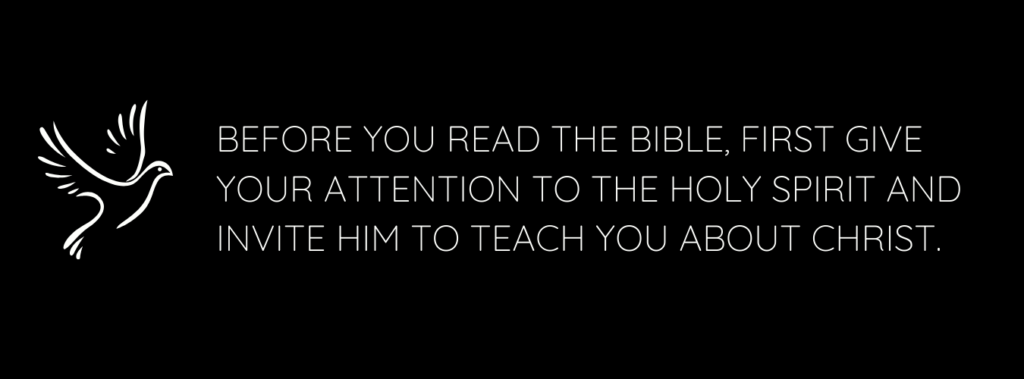
When my attention is completely on Him and I am experiencing His presence, I invite Him to show me who He is in His word.
Notice that I center my heart around just knowing Him in His word. I want a revelation of who He is and what His heart is above all else.
Once I am in tune with the Spirit of God, I will often ask Him where He wants me to read from or open to a place in the Bible that has been on my heart.
Then I start reading… SLOWLY.
I want to catch every word that the Lord wants to speak to me about.

At this point, The Holy Spirit starts to remind me of other scriptures I’ve read before and leads me to do further research on them (Using the 4 methods I talk about in the next chapter).
The end result is always the same:
I leave with a new revelation of who God is and a deep hunger to study the word of God even further.

4 Effective Bible Study Methods For Going Deeper
Now that you have an understanding behind the mindset for reading the Bible, it’s time to get into the practical side of this.
In this section, I’m going to go over 4 simple Bible study methods that I use daily to go deeper into scripture and discover the Bible as a whole.
Here’s what you need to know:
1. Reading The Bible In Context

Context is probably the most important part of basic Bible study.
Studying context simply means to look at what is happening in the background of an event, idea, or statement.
Without context, you can take a passage like:
“It has been said, ‘Anyone who divorces his wife must give her a certificate of divorce.’ (Matthew 5:31)
And say:
“See.. the Bible says that Divorce is okay”
Clearly we know that Jesus is actually talking about divorce being a sin in the rest of this passage.
This is why we need to study the Word of God in context.
Here’s four ways you can look at the context of a passage in the Bible:
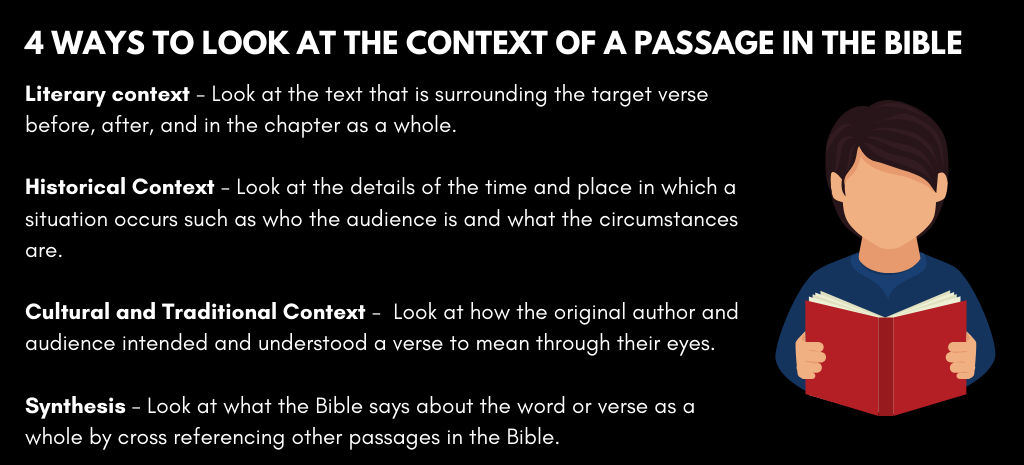
In short, you want to at least read the passage in literary and historical context.
This basically means to read the text surrounding the verse you’re studying, look at the chapter as a whole, and identify what is going on in the background.
A few good questions to ask for finding historical context are things like:
- Who is speaking?
- Who is being addressed? (the audience)
- What location are they in?
- What was the relationship between these people?
And so on…
As you look at context, you also want to get an idea of what the Bible says about the scripture you’re studying as a whole.
Which brings us to our second method:
2. Cross Referencing Words In The Bible
Cross-referencing simply means to look at other parts of scripture that are related to the word or verse you’re reading about.
You want to cross-reference the words or phrases you study in the Bible so that you can understand what the Bible says about it as a whole.
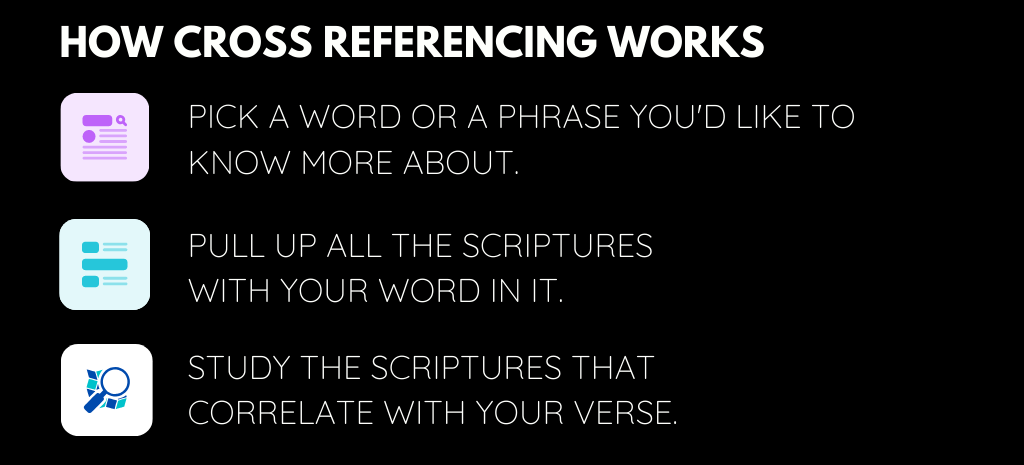
If you look at all the times that Jesus speaks in the New Testament, He almost always refers to something that was previously spoken about in the old testament.
For example:
Let’s say we are reading from (Matthew 4:1-4):
“Then Jesus was led up by the Spirit into the wilderness to be tempted by the devil. And the tempter came and said to him, “If you are the Son of God, command these stones to become loaves of bread.” But he answered, “It is written, “‘Man shall not live by bread alone, but by every word that comes from the mouth of God.'”
I will usually cross-reference words (or phrases) that I want to know better and those which the Holy Spirit points out to me, but in this case, there is a direct reference to previous scripture (“it is written”).
Here’s how you can cross-reference this verse:
First, Go on your Youversion Bible app, click search, and type in the words that stand out.

Sometimes you will have to go through many different passages before you find a few that are applicable to the verse you’re looking at.
Luckily for us, when we look up the words “bread alone” we find the scripture we are looking for on the very first page.
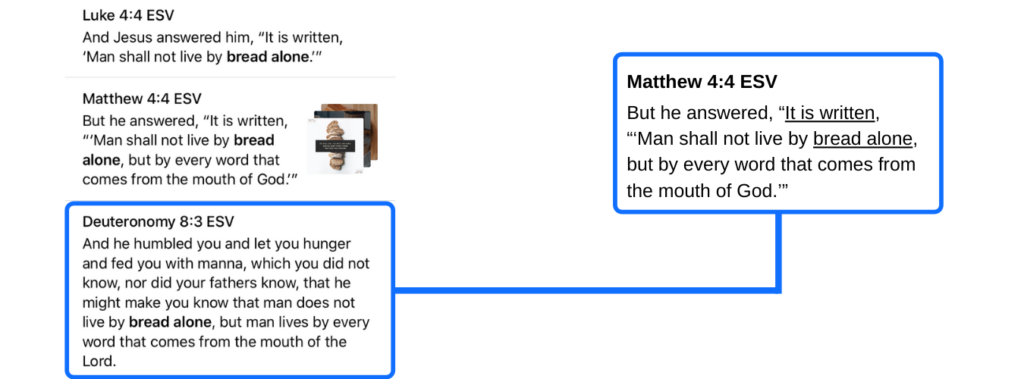
Deuteronomy 8:3 says:
“And he humbled you and let you hunger and fed you with manna, which you did not know, nor did your fathers know, that he might make you know that man does not live by bread alone, but man lives by every word that comes from the mouth of the Lord.”
Not only does this passage give us a better understanding of the words bread alone, but it also shows us why Jesus went into the wilderness to fast as well.
Pretty cool huh?
On to the next…
3. Finding symbolism in the Scriptures
Have you ever noticed how much symbolism there is in the Bible?
You may already know some of the most common symbols:
- The bread represents the body of Christ
- The wine represents the blood of Christ
- The dove represents the Holy Spirit
- The Lamb represents the sacrifice of Jesus
However, these are only a few of the most popular ones we know.
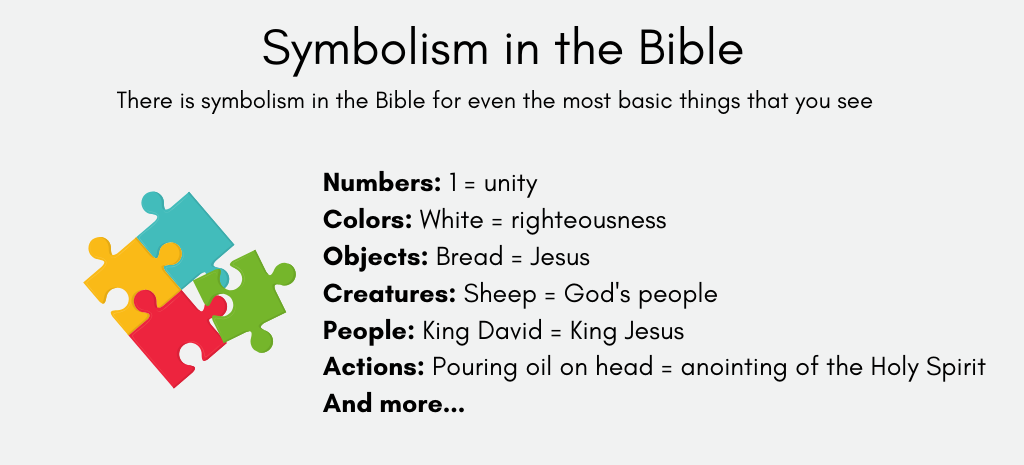
The problem is that even though the Bible is very big on symbolism, most Christians give very little credit or thought to the rest of the symbolism in the Bible.
Think about this:
- Sacrifice and worship in the old testament was symbolic
- The tabernacle was symbolic
- Communion is symbolic
- Baptism is symbolic
- Jesus spoke a lot in symbols
Symbols are important to God, therefore, they should be important to us.
When you start to define the symbolism behind certain words or phrases in the Bible, you will be able to understand scripture in a way that goes way beyond what you see on the surface.
The question is:
How do you find out the symbolism behind a word or verse in the Bible?
Defining symbols in the bible is a lot like solving a puzzle.
The more pieces you put together, the easier it will be for you to see the bigger picture of what the word or phrase means.
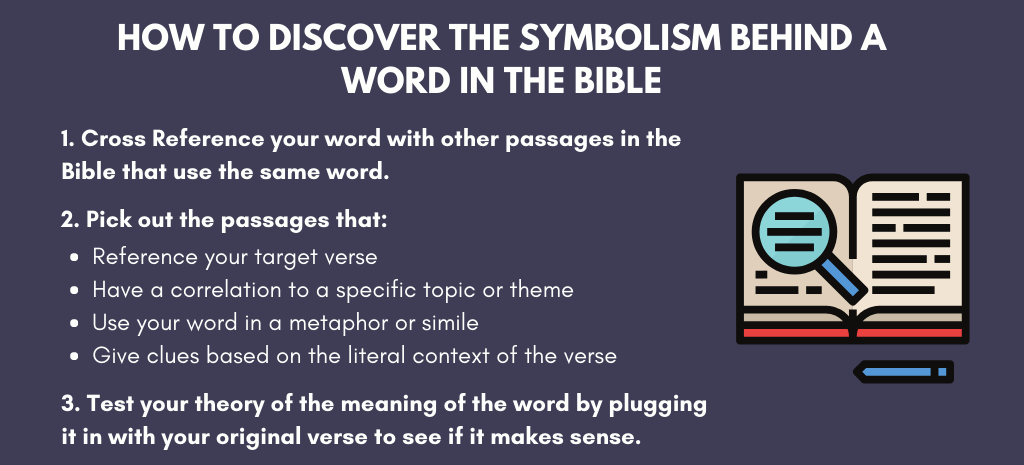
Let’s try an easy one together:
“He makes my feet like the feet of deer, And sets me on my high places.” (Psalm 18:33)
What does it mean that the Lord makes your feet like deer’s feet?
In order to define the symbolism behind the word deer, let’s cross-reference it.
Like I mentioned earlier, not all scripture will help you define the symbolism in your word.
For example:
“ten fat oxen, and twenty pasture-fed cattle, a hundred sheep, besides deer, gazelles, roebucks, and fattened fowl.” 1 Kings 4:23 ESV
Based on the context of this verse, we can’t tell much about what deer might mean.
On the other hand, let’s look at Genesis 49:21:
“Naphtali is a deer let loose; He uses beautiful words.”

As you can see, the word deer is directly correlated with beautiful words.
Once you have an idea of what the word could mean, test it by using it in a sentence with your original verse.
“He makes my feet like the deer’s” could mean that He makes my feet beautiful.
Hmm…sound familiar?
“How beautiful are the feet of those who preach the good news!” (Romans 10:15)
Ahh, It would make perfect sense that the psalmist is talking about beautiful words in regards to the Gospel.
Speaking of words, it’s important to know the full meaning behind each word whenever you study scripture.
4. Studying Greek and Hebrew Words in The Bible
Since the Bible was not originally written in the English language, translators have to use trade-offs to define certain words and phrases in the Bible.
One of the trade-offs is deciding whether to use a literal word-for-word translation or to translate based on the intended meaning.
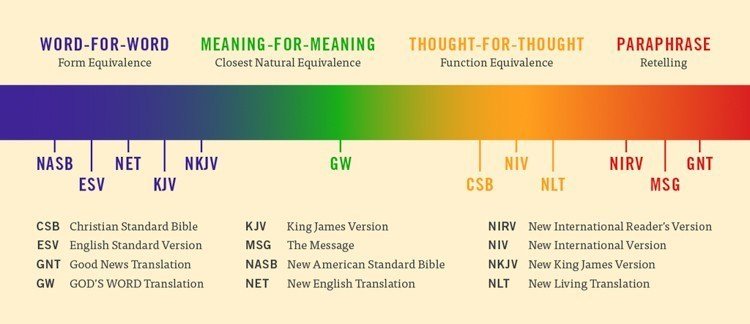
This means that no matter which translation you read, you may still not understand the full meaning behind a word or phrase until you look at the definition of the original word.
This is where researching the Greek / Hebrew word definitions comes in.
Let’s look at an example:
In Ephesians 3:19, you’ll find two words for the word knowledge:
“and to know the love of Christ that surpasses knowledge, that you may be filled with all the fullness of God.”

The 2 words here for know and knowledge are Ginōskō and Gnōsis.
Both are defined as knowledge and both can be used to know something.
However, there is a very big difference in the meaning of the words in Greek.
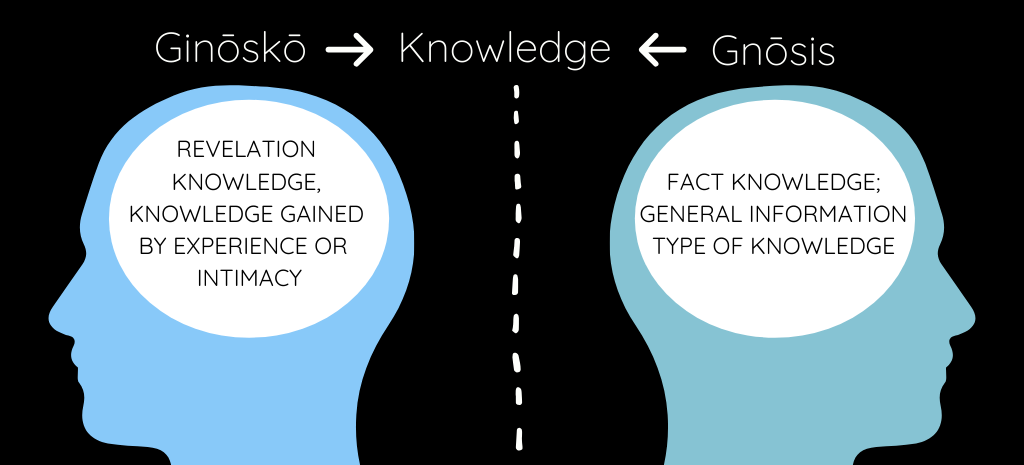
Ginosko refers to a revelation type of knowledge, a type of knowledge that is known by experience or through intimacy.
Gnosis, on the other hand, is just a matter of fact knowledge. It refers to a knowledge that is more information than experience.
This is what Ephesians 3:19 is talking about:
We want to know (Ginosko) the love of Christ with an experience type of knowledge because it surpasses fact knowledge (Gnosis).
Do you see why researching Greek and Hebrew definitions is so important?
Since we looked beyond the surface of the English word, we were able to uncover the deeper meaning behind these two words that made it easier to understand the verse.
The best part about looking into the original text is that you don’t need to have a seminary degree or know anything about Greek and Hebrew.
All you need is a couple of basic Bible study tools to get started right away.

Best Tools For Studying Greek and Hebrew Words
Literal Word App
The Literal Word app is my number one go-to app for quick and easy word lookup.
This app allows you to click on most of the main words in each verse and get a definition right away. You can also cross-reference the word you’re researching right away without having to look somewhere else.
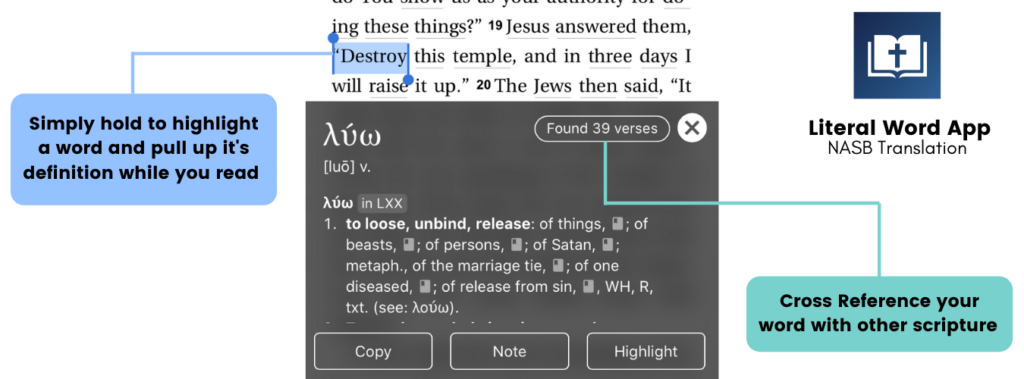
Logos Bible App
The Logos Bible app is very similar to the Literal Word app in that it allows you to look up the text just by clicking on the word. It also gives you a cool little pie chart of what the word is defined as through the Bible. The only con is that it’s a bit more complex to use than the Literal Word app.
Now that you have a basic understanding of the different study methods, let’s put it all together and study a passage step-by-step to uncover the deeper meaning.

How to Study the Bible Step-By-Step Walkthrough
In this section, we’re going to study a passage in the Bible step-by-step to find the deeper meaning of what it means.
Let’s jump right in!
The passage we’re going to be studying is from Matthew 6:22-23 which says:
22 “The eye is the lamp of the body. So, if your eye is healthy, your whole body will be full of light, 23 but if your eye is bad, your whole body will be full of darkness. If then the light in you is darkness, how great is the darkness!
The question we’re asking is this:
What did Jesus really mean when He said the eye is the lamp of the body?
Think about this for a moment.
Was He talking about our physical eyes? If so, How can light or darkness come from the eyes?
In order to answer these questions, the first thing we’re going to do is look at the literal context of the passage.
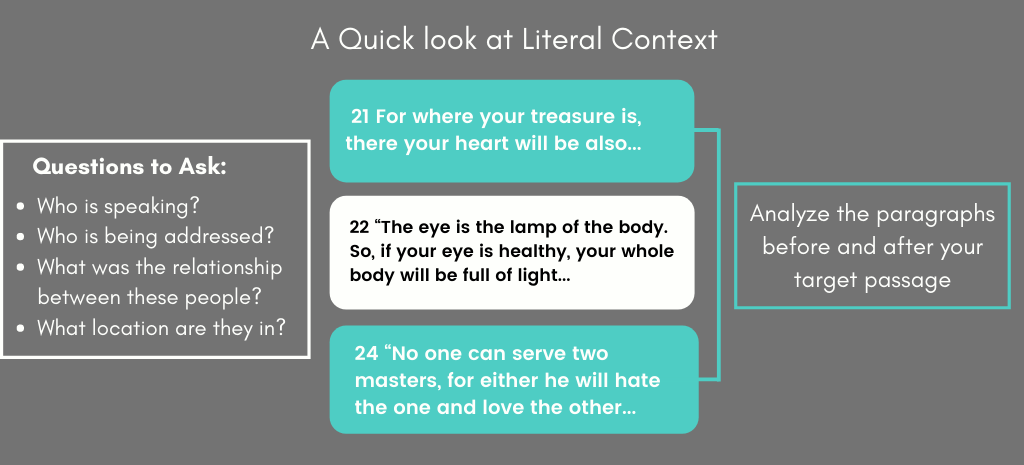
Starting from the beginning of Matthew chapter 5, you’ll find that Jesus is addressing a crowd of people with the sermon on the mount.
He continues to address the people in chapter 6 by speaking about the hypocrites and goes on to share about laying up treasures in heaven (Matthew 6:19-21) right before our target verse.
Notice the last verse before our passage:
For where your treasure is, there your heart will be also. (Matthew 6:21)
Then, He goes into talking about the eye being the lamp of the body.
Hmm…
Can your heart have anything to do with the lamp of the body?
If so, how can it be the light or darkness in someone?
Let’s go deeper…
It may be that the word “eye” is symbolic for something.
Let’s cross-reference and find out if we can find other scriptures that can shed some light on what it might mean.
Go in your Youversion Bible App, click search, and type in the word “eye”.

What comes up is many different passages with the word eye or eyes in it.
Now it’s important to know that a lot of these passages don’t give any clues to what the word eye means.
That’s ok…
Keep searching until you find a couple that catch your eye 😉
Here’s a few I found:
- “For my eyes have seen Your salvation,” (Luke 2:30 NASB)
- “For you have said, ‘My teaching is pure, And I am innocent in your eyes.’” (Job 11:4 NASB)
- “And if your eye causes you to sin, pluck it out and cast it from you. It is better for you to enter into life with one eye, rather than having two eyes, to be cast into hell fire.” (Matthew 18:9) NKJV
- Be gracious to me, O Lord, for I am in distress; My eye is wasted away from grief, my soul and my body also. (Psalm 31:9) (NASB)
Look closely at the context surrounding our target word.
What comes to mind?
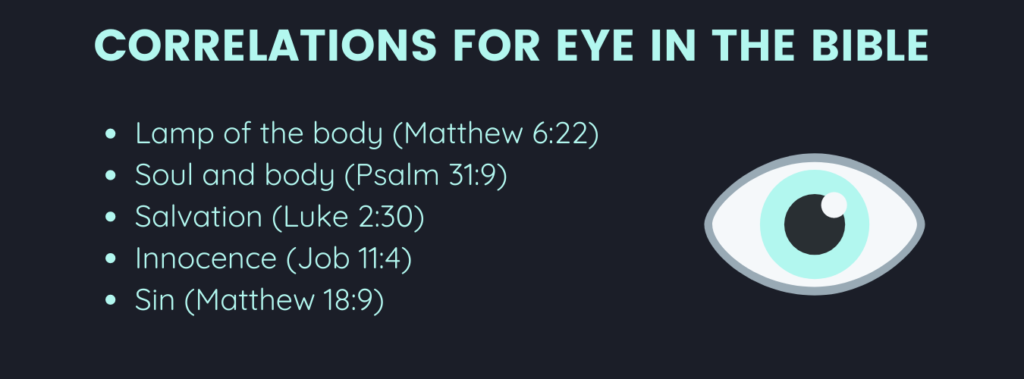
You might have noticed that the eye is directly correlated with salvation, sin, and innocence. (Luke 2:30) (Matthew 18:9) (Job 11:4)
You might also notice it’s tied to the soul and the body from Psalm 31:9.
This is the part where the Lord will begin to lead your thinking a lot to help you put the pieces together.
He will bring to your remembrance other parts of scripture.
You begin to ask questions like:
- Where does salvation first happen?
- Are we saved in the heart? (from our previous theory)
- Why is the eye correlated with the soul and the body?
After this, You might have come to the conclusion that the eye is symbolic for the spirit of man.
Why?
- Jesus said we must first be born again in spirit (John 3:5) and salvation happens first in the spirit of man.
- You know that people are made up of spirit, soul, and body based on 1 Thessalonians 5:23. This would fit perfectly with our Psalm 31:9 verse.
Okay, so we have a pretty reasonable idea of what the eye could mean, but we can’t be sure until we put it to the test.
One of the easiest ways to test your definition is by replacing the original word with the definition to see if it makes sense.

Another thing that you might find interesting is if you cross-reference the word lamp in this paragraph, you’ll find this passage:
The spirit of man is the lamp of the LORD, searching all his innermost parts. (Proverbs 20:27)
This passage confirms our theory that the eye is a representation of the spirit of man.

Now we know that Jesus was talking about the spirit of man being the lamp of the body.
Let’s put this all together:
Based on the context of chapter 6, we know Jesus was telling the people to not be like the hypocrites. Those who pretended to live out a life of goodness in appearance, but were actually far from that.
In essence, Jesus was saying:
If you are truly born again in spirit (if your eye is healthy), you will live out a life of righteousness and be the light to those around you (the body will be full of light).
However…
If you have not been born again (eye is bad), the only thing your spirit will produce is a lifestyle of sin and dead works (your whole body will be full of darkness).
The hypocrites claimed to do good works and live in righteousness, but their evil deeds showed that they weren’t truly born again.
In Conclusion:
Your goal with bible study should always be to come with a mindset of wanting to know and encounter Jesus through his word.
As you tune in with the Holy Spirit before you read, He will be the one who will teach you and reveal Christ to you through the scriptures.
The Holy Spirit will also lead you to dig deeper into certain passages, which you can do by studying the context of a verse, defining Greek or Hebrew words, cross-referencing, and looking into symbolism.
The more you encounter Jesus and receive revelations about who He is in the Bible, the greater your hunger for more will be.
Now I want to hear from you:
How do you study the Bible?
What are your favorite tools for Bible study?

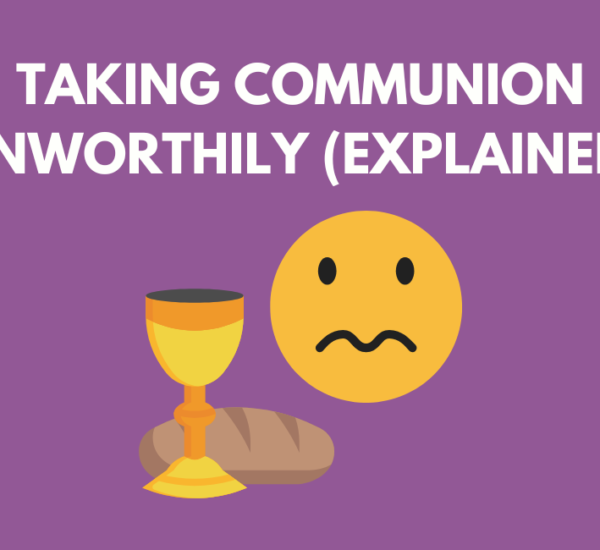
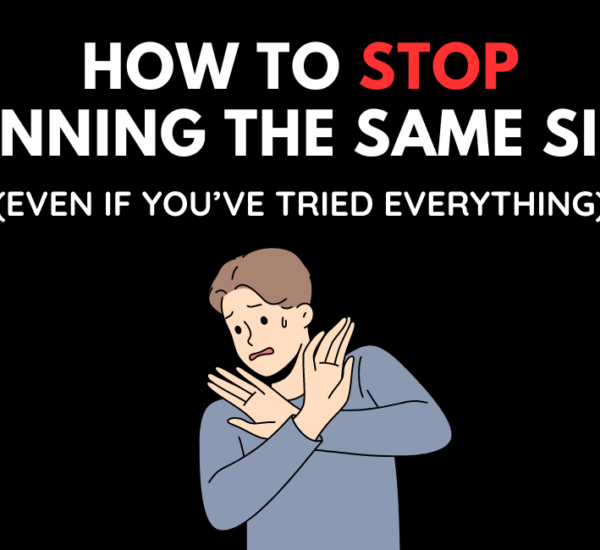
thank you helping dig deeper and understand gods word. God Bless you
Great tool!!
This was wonderful! Thank you so much!!
Thank bro, very useful content.
Thank you Brother Valentyn, I am truly blessed with this article.
I use Dove Bible app developed by Jianyu Studio for my study because it allow numerous Translations with crossrefrencing. With MySword Bible because it’s concordance contains Both Thayer’s Definition and Strong’s Definition.
Thank you Brother Valentyn Svit since yesterday I came across you web, your articles are really blessing me.